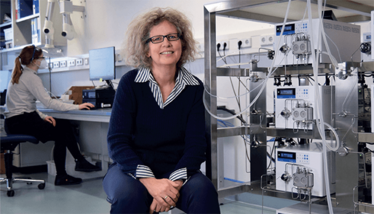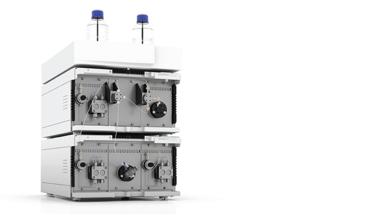
The Future of LNP Formulation Technology is Here
More and more researchers are exploring the exciting potential of mRNA, most often in combination with encapsulation into lipid nanoparticles. For this, they require lab-scale systems that support their R&D efforts. To address this need, KNAUER has developed the IJM NanoScaler for lab-scale lipid nanoparticle production
sponsored by KNAUER
Pre-pandemic, mRNA was already an exciting field, but the overwhelming success of the mRNA-based COVID-19 vaccines has led to even more activity. Conventional therapeutics involve the production of an API in a lab or factory, which is then delivered and administered to the patient. mRNA vaccines flip this notion on its head. mRNA vaccines contain the code that enables the body to produce proteins that have a therapeutic effect. Essentially, mRNA vaccines turn the body’s cells into their own therapeutic producing factories. The “recipe” for the protein required is delivered by means of the mRNA’s genetic code, which is then translated into a protein by the cell’s ribosomes.
It’s a completely new – and incredibly exciting – approach. In fact, I could even go as far as saying that it has the potential to revolutionize medicine. mRNA vaccines can be modified much faster than conventional vaccines; even now, work continues to update the current COVID-19 vaccines to confer better immunity to new coronavirus variants.
But the potential of mRNA is not just limited to this pandemic – or even to vaccines. Research is also being carried out to produce therapies for a diverse range of difficult to treat diseases, such as cancer, HIV, rabies, and malaria. mRNA could also bring us closer to the era of personalized medicine – where patients are given therapeutics that can be tailored to their own genome.

Paul Pietsch is Head of Engineering Solutions for Knauer’s LNP production equipment. This team helps customers adapt LNP systems to their needs, and offers customers support and improvements.
A helping hand against the pandemic
Prior to the pandemic, mRNA technology was generally limited to small-scale clinical trials. With COVID-19, however, came the need to scale up production – and fast. And that’s where KNAUER came in.
KNAUER has 60 years of experience in the development and production of scientific equipment. Our main expertise has historically been in the field of liquid chromatography and accompanying equipment. Liquid chromatography takes place at high pressure and requires highly accurate pumping, dosing, and liquid handling systems to be effective.
Shortly after the outbreak of thepandemic, we received a request from a mysterious customer who was interested in our pumping and dosing technology. We were excited to find out that the customer was a well-known pioneer in mRNA technology – and is now one of the world’s foremost vaccine producers. The customer needed help in overcoming the bottleneck of liquid nanoparticle (LNP) encapsulation. We worked intensely in collaboration on this project – the end result being that our IJM (impingement jets mixing) units were used for LNP formulation for COVID-19 vaccines.

Our CEO, Alexandra Knauer, in front of one of our IJM NanoProducer Units – the systems that are being used to produce mRNA coronavirus vaccines
Essential encapsulation
mRNA is an extremely fragile molecule and can degrade and break down easily without protection. As its structure contains the instructions to produce the protein required for the therapeutic effect, it is very important that it stays fully intact.
Encapsulation protects the mRNA nuclease degradation and helps overcome physiological barriers; in an LNP, the mRNA can enter cells by means of endocytosis. Put simply, mRNA therapies would not work without LNP encapsulation. And because encapsulation is so important, the parameters used in the process must be exact to ensure high efficiency and homogenous particle size distribution. In fact, the conditions required to achieve these goals depends on the specific lipid composition and the mRNA strand being used. It’s also worth noting that the use of lipids, which can be modified, also shows promise for targeted therapies; for example, lipids modified to favor endocytosis with cells showing cancer markers could be used for targeted cancer therapies.
Our IJM Units use KNAUER’s high- precision pumping technology to jet mix mRNA in aqueous solution with a stream of lipids at high velocity. It is inside our IJM that the magic happens – the mRNA is encapsulated in the interior core through electrostatic interactions with the lipids to form LNPs. This nanoparticle structure increases stability in physiological fluids and protects the mRNA from nuclease degradation.
Research accessibility
Our technology showed outstanding performance in the large-scale production of mRNA encapsulated in LNPs for use in COVID-19 vaccines, but what about the small scale? There has been a clear gap in the market for researchers who want to develop new mRNA therapies, so we have launched a new benchtop system for R&D purposes. The IJM NanoScaler is suitable for pre-clinical research on therapeutics encapsulated in LNPs, including mRNA vaccines and other therapeutics. The system is robust but compact enough to sit on the bench of an R&D lab. It allows for the production of LNP- encapsulated mRNA therapeutics in volumes of several milliliters.
The Nanoscaler has five different impingement jets mixers – allowing researchers to test different process parameters and formulations to perfect their LNP encapsulation. Or customers can implement their own mixing device. Once the optimum operation parameters have been identified, the process can easily be scaled for GMP-production using one of our IJM NanoProducer units.
Right now, mRNA is one of the biggest trends in the industry. There is a lot of investment entering the field – and because of that, many research institutions are focusing on mRNA therapeutics. They want to use the best technology for their work, including, of course, our proven IJM technology! Therefore, we downscaled a system from our production technology to create the laboratory-scale IJM NanoScaler, which makes the R&D phase for LNP formulation more accessible to researchers.
The IJM NanoScaler is designed to make the R&D on LNP encapsulation a simpler, faster, and more cost-effective process as this system allows the use of small mRNA volumes in μL scale. This allows both screening for the best encapsulation conditions and small scale production on the IJM NanoScaler, which can then be scaled up to the g scale using the IJM NanoProduction systems.
By testing formulations and mixing conditions on a smaller benchtop system before large-scale production, money is saved; proof-of-concept testing is able to take place before large-scale investments are made. KNAUER offers the whole range of LNP production equipment from preclinical to cleanroom compatible production scale, allowing reproducible and scalable production of lipid nanoparticle–mRNA formulations.
I said before that I expect mRNA therapeutics to revolutionize medicine – from personalized medicines to the treatment of intractable diseases, such as cancer. KNAUER is extremely excited to have played a part in this revolution so far – and equally excited to supply further forward momentum with our new lab-scale system for the production of new lipid nanoparticle formulations. The future of pharmaceuticals is here.

KNAUER IJM NanoScaler – for research and development on lipid nanoparticle formulation.



















